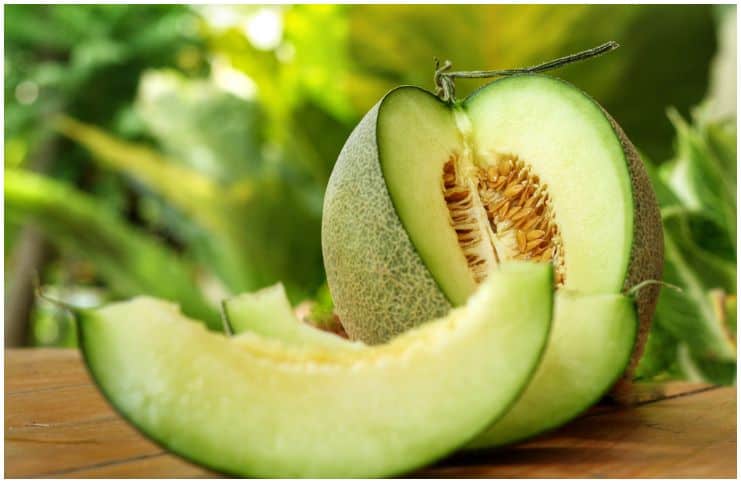Honeydew melon, also known as winter melon or honey melon, is a type of melon noted for its natural greenish-yellow rind/skin and green flesh. The fully ripe fruit is highly delicious and hence a highly cultivated plant.
Winter melons and other melons are part of the Cucurbitaceae family, which is divided into vegetables (pumpkins, squashes, and cucumbers) and fruits (melons).
It is usually cultivated in semiarid regions and has a smooth firm outer rind which turns from green to whitish-yellow as it ripes. Due to its sweet flesh, it is commonly incorporated in smoothies and fruit salads.
When covered with foil to keep it fresh, an open honeydew melon will keep for 2 or three days in the fridge.
Nutrition Facts
It is an excellent source of zinc, vitamin C, vitamin K, copper, thiamin, dietary fiber, phosphorus, potassium, niacin, riboflavin, folate, vitamin B6, manganese, pantothenic acid, and calcium.
Health Benefits of Honeydew Melon
Speeds Up Healing
Vitamin C is a potent water-soluble antioxidant with some fantastic health benefits for the body. For instance, it is a vital nutrient for immune and adrenal function, healthy gums, blood vessels, skin, and bone, and cellular energy production.
Also, according to research, high levels of this vitamin can help to speed up the human body’s natural healing processes. This fruit contains 18mg of vitamin C, which is about 30 percent of the daily recommended intake.
Decreases Cramps
Potassium is an important body mineral that plays an essential role in the synthesis of muscle tissues and proteins as well as for both electrical and cellular functions.
In addition, potassium has an important role in bone health due to its capacity to neutralize bone-depleting metabolic acids.
Another important benefit of consuming foods rich in potassium is improved muscle strength and decreased muscle cramping.
The World Health Organization (WHO) recommends 3,510 mg of potassium a day and also suggests that the average American is not taking in the recommended dose of this essential mineral.
A deficiency of potassium is called hypokalemia with symptoms, such as – feeling weak, severe muscle fatigue, and muscle cramps. This fruit contains 228 mg of potassium, which is about 7 percent of the daily recommended intake.
Cardiovascular health
Vitamin B6, also known as pyridoxine, is a water-soluble vitamin (that means it dissolves in water) which is important for the healthy function of the nervous system.
Without enough vitamin B6, homocysteine builds up in the human body. A high level of homocysteine can lead to a higher risk of heart disease and chronic inflammation.
Moreover, regularly consuming foods high in vitamin B6 may provide some relief from rheumatoid arthritis as well as it can help to lower inflammation in the body. In addition, pyridoxine is involved in keeping the thymus, lymph nodes, and spleen healthy.
This fruit contains 0,1 mg of vitamin B6, which is 4 percent of the daily recommended intake.
Strong Bones
Vitamin K, discovered in 1929, is a fat-soluble vitamin that is naturally present in some foods. The “K” comes from its German name – Koagulationsvitamin.
According to a study done by the Harvard School of Public Health, vitamin K helps produce 4 of the 13 essential proteins needed for blood clotting. Also, it is thought that without this vitamin, humans will bleed to death in 10 minutes from a significant cut.
Osteocalcin, a bone-building protein, depends on vitamin K to bind calcium for transport into the bones. This keeps bones healthy and enhances mineralization.
While the effects of a deficiency in this vitamin can show up in more serious problems, such as – bone loss, cardiovascular disease, and tooth decay, a lack can also manifest in smaller symptoms including heavy periods, easy bruising, or nosebleeds.
This fruit contains 2,9 mcg of vitamin K, which is 4% of the daily recommended intake.
Beneficial During Pregnancy
Vitamin B9, better known as folate, is essential for human cells due to its ability to repair and synthesize DNA. Vitamin B9 is also important for healthy brain function, as well as emotional and mental well-being.
Moreover, folate helps prevent neural tube defects, which are serious congenital disabilities of the brain (like anencephaly) and the spinal cord (like spina bifida).
A deficiency in vitamin B9 can result in sudden hearing loss, and seniors who consume foods rich in folate regularly report lower levels of hearing loss than those who don’t. This fruit contains 19 mcg of folate, which is 5 percent of the daily recommended intake.
Selection And Storing
When buying this fruit, it should be firm, and you should avoid obvious bruising, scarring, and discolorations on the melon. Also, a ripe fruit will have an aromatic smell.
A ripe melon can be refrigerated for about a week or can be kept at room temperature for three days.
Side Effects
There are no known side effects, except some rare cases of an allergic reaction, that may include – rash, diarrhea, hives, wheezing, itching of the mouth, cramps, and nausea.
READ THIS NEXT
White Radish Leaves – Nutrition Facts
References https://extension.umn.edu/fruit/growing-melons-home-garden https://pubs.acs.org/doi/abs/10.1021/jf00114a051?journalCode=jafcau http://jnnp.bmj.com/content/72/5/567

Jesus Christ bless you